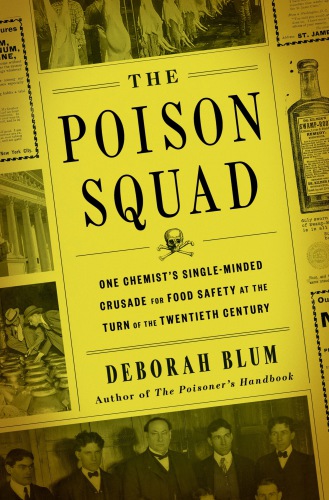
The Poison Squad
One Chemist's Single-Minded Crusade for Food Safety at the Turn of the Twentieth Century
کتاب های مرتبط
- اطلاعات
- نقد و بررسی
- دیدگاه کاربران
نقد و بررسی

May 28, 2018
America’s nauseating industrial food supply of yesteryear sparks political
turmoil in this engrossing study of a pure-foods pioneer. Pulitzer-winning science journalist and Undark magazine publisher Blum (The Poisoner’s Handbook) looks back to the end of the 19th century, when unregulated manufacturers routinely added noxious substances to the nation’s foodstuffs: cakes were colored with lead and arsenic; milk was preserved with formaldehyde; brown sugar was padded out with ground-up insects; processed meats contained every variety of flesh and filth. Blum centers the book on Harvey Wiley, crusading head of the Department of Agriculture’s Bureau of Chemistry, who fed a “poison squad” of human volunteers common food adulterants like borax to see if they got sick—and they usually did; his reports helped pass the 1906 Pure Food and Drug Act. Blum’s well-informed narrative—complete with intricate battles between industry lobbyists and a coalition of scientists, food activists, and women’s groups—illuminates the birth of the modern regulatory state and its tangle of reformist zeal, policy dog-fights, and occasional overreach (Wiley wanted to restrict the artificial sweetener saccharin, which nowadays is considered safe, and wasted much time trying to get corn syrup relabeled as glucose). The result
is a stomach churner and a page-turner.

July 1, 2018
A fascinating--and disturbing--history of the late-19th-century crusade for food safety, led by a pioneering scientist who fought hard against "chemically enhanced and deceptive food manufacturing practices," some of which we still see today.The Pure Food and Drug Act of 1906 ended a century of scandal and bitter political maneuvering, with major impetus from Harvey Washington Wiley (1844-1930), a genuinely unknown American hero. Pulitzer Prize-winning journalist Blum (Director, Knight Science Journalism Program/MIT; The Poisoner's Handbook: Murder and the Birth of Forensic Medicine in Jazz Age New York, 2010, etc.) offers less a biography than a vivid account of Wiley's achievements. As she writes, 19th-century industrial chemistry "brought a host of new chemical additives and synthetic compounds into the food supply. Still unchecked by government regulation, basic safety testing, or even labeling requirements, food and drink manufacturers embraced the new materials with enthusiasm." Throughout the book, the author clearly busts the myth of "a romantic glow over the foods of our forefathers." Adding formaldehyde to milk kept it fresh in a warm room for days. Copper sulfate restored the faded green of canned beans. Yellow lead chromate colored candy. Slaughterhouses put out poisoned bread to discourage rats, and "then the rats, bread, and meat would go into the hoppers together." Wiley became chief chemist of the Department of Agriculture in 1883. Already alarmed at food adulteration, he delivered speeches and wrote popular articles, working closely with muckraking journalists and the burgeoning pure food movement. Congress routinely quashed reforms before President Theodore Roosevelt supported the 1906 bill, but Blum emphasizes that he showed no interest before winning the 1904 presidential election; afterward, he paid more attention to objections from the food industry. The author maintains that Wiley was the true "Father of the Pure Food and Drug Act." Never popular with superiors, he clashed with them over the act's enforcement, resigning in 1912 to take over the labs at the Good Housekeeping Institute, where he continued making waves until his death.An expert life of an undeservedly obscure American.
COPYRIGHT(2018) Kirkus Reviews, ALL RIGHTS RESERVED.

September 1, 2018
Concerns about clean food, campaign contributions from food company lobbyists, and political in-fighting halting all progress may sound familiar--but this investigation by Blum (Knight Science Journalism Program, Massachusetts Inst. of Technology; The Poisoner's Handbook) is based on the U.S. Department of Agriculture (USDA) in the 1880s. The work outlines the 30-year career of Dr. Harvey Wiley, who left his position as Purdue University's first chemistry professor to become the chief chemist for the USDA in 1883. Once hired, he began systematically testing food products for mislabeling and adulteration, often on human subjects. This book not only revisits Upton Sinclair's The Jungle, the exposé of horrendous meat processing practices of the time, but also unearths lesser-known but just as stomach-turning food scandals, such as milk "preserved" with formaldehyde, eggs and cheese blended with borax, and candy containing arsenic. Illuminating the little-known history of a progressive scientist and crusader for consumers' rights, this well-written and well-researched work serves as a reminder of the necessity of regulations and regulators to hold companies accountable. VERDICT An intriguing and often horrifying saga of government policy and food regulation.--Susan Hurst, Miami Univ. Libs., Oxford, OH
Copyright 2018 Library Journal, LLC Used with permission.

August 1, 2018
After signing America's first food-and-drug law in 1906, Teddy Roosevelt was quick to claim paternity. But in this compellingly detailed chronicle, Blum identifies Harvey Washington Wiley as the true father of the much-needed legislation. Readers follow this Purdue chemist, named the Department of Agriculture's lead scientist, as he painstakingly documents the harmful effects of contaminants and toxins in the food supply and then fearlessly crusades for legal measures to protect the public. Roosevelt does give Wiley timely (albeit inconsistent) support for his legislative agenda. But perhaps more important is the political momentum generated by Upton Sinclair's The Jungle, exposing the horrifically unsanitary practices of Chicago's meat-packers. Outspoken cookbook maven Fannie Farmer and progressive food-processing titan Henry Heinz also join the fight. But readers see how powerful industry executives connive with myopic bureaucrats to deny Wiley and his allies full enforcement of the new food-and-drug law, finally sending a frustrated Wiley into early retirement. Citing worrisome recent attacks on consumer-protection laws, Blum reminds readers of the twenty-first-century relevance of Wiley's cause.(Reprinted with permission of Booklist, copyright 2018, American Library Association.)

























دیدگاه کاربران